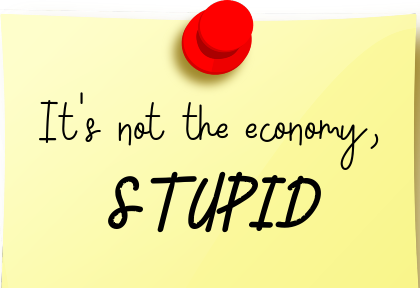
“Europe Is Upset With Biden On Trade” proclaimed the Wall Street Journal on January 30, noting that the continent’s “trade troubles with the Trump administration” continue under a successor who “has kept trade barriers in place.”
Readers who turned to page 8 learned that such woes aren’t simply the result of inaction, inertia or insufficiency, but that “in matters of international economics, Biden shared some of Trump’s worldview.” Sometimes, an opened door to trade was paired with a newly closed window, such as replacing “the tariffs Trump slapped on European steel and aluminum” with “more modest fees that nonetheless cost European metal exporters hundreds of millions of dollars last year.” Senator Joe Manchin proposed strings on a tax credit to discourage using car parts from countries unless they were “free-trade partners,” unaware this would disqualify imports from Europe as well as his intended target, China.
The party of Jefferson has reversed its founder’s call in the First Inaugural Address for “peace, commerce, and honest friendship with all nations, entangling alliances with none.” Meanwhile, Ron Paul’s 2007 book A Foreign Policy of Freedom: Peace, Commerce, and Honest Friendship goes unread in a Trump-dominated GOP.
Even radical third-party presidential candidate Cornel West, denouncing the nation-state’s “monopoly on violence” and the ideology of nationalism as “an impediment, an obstacle that doesn’t allow us to see how nation-states are connected” in an interview with The Internationalist, ignores its role in preventing mutually beneficial deals, the opposite of what he denounces as “predatory capitalism, obsession with profit, squeezing out of nature, workers and anything you can touch in order to generate some kind of commercial and market value.”
It’s not like a free-market platform in 2024 is as quixotic as, say, the Prohibition Party’s in 1936. Trump-era trade wars have taken a bite out of the bottom lines of iconic American brands from Ford and Harley-Davidson to Apple (as well as newspapers printed on pulp from Canada).
A twenty-first century during which Hillary Clinton will only vouch for a “hemispheric common market, with open trade” behind closed doors could learn from the populists of the nineteenth. The movement against England’s regressive Corn Laws in the early 1800s, as historian Allen Guelzo observes, “saw in protectionism one of the chief props of an agricultural aristocracy.” West calling “a war of all against all” economy “market-driven” obscures how today’s aristocratic incumbents fear market competition. The Emma Goldman lauded by West for having “championed the struggle for freedom and justice” did so in camaraderie with the followers of Henry George, whose 1886 volume Protection Or Free Trade was one long argument for the latter.
A renewal of such popular pressure, including among those who can only vote in the USA with their dollars, can help make sure that politicians will think twice about assuming that trade walls are a winning strategy.
New Yorker Joel Schlosberg is a senior news analyst at The William Lloyd Garrison Center for Libertarian Advocacy Journalism.
PUBLICATION/CITATION HISTORY
- “Everyone should be upset with Biden (and Trump) on trade” by Joel Schlosberg, The Lebanon, Indiana Reporter, February 6, 2024
- “Biden, Trump trade walls a losing strategy” by Joel Schlosberg, Rocky Mount, North Carolina Telegram, February 9, 2024
- “Everyone should be upset with Biden and Trump on trade” by Joel Schlosberg, The Elizabethton, Tennessee Star, February 9, 2024


